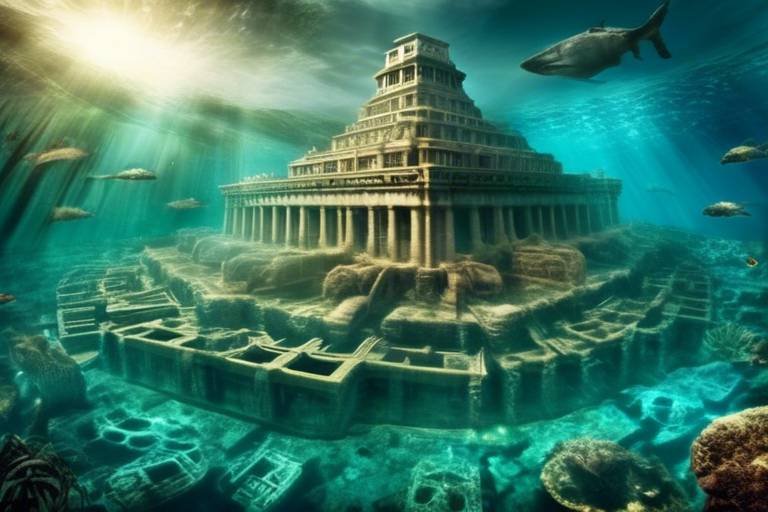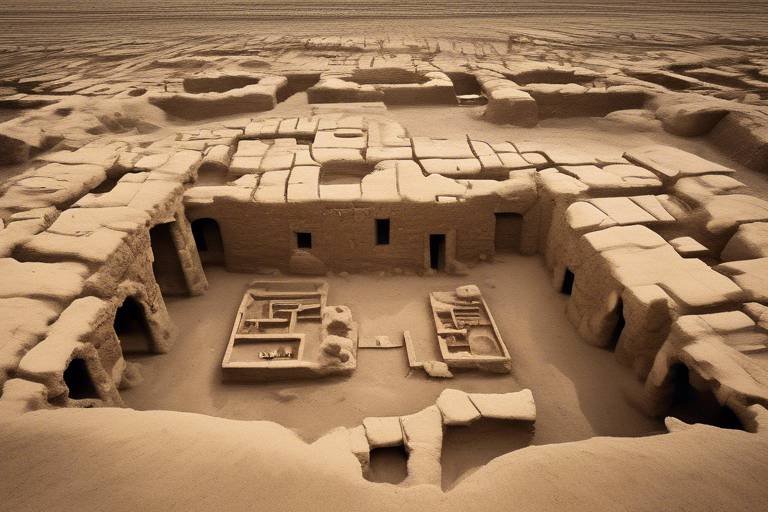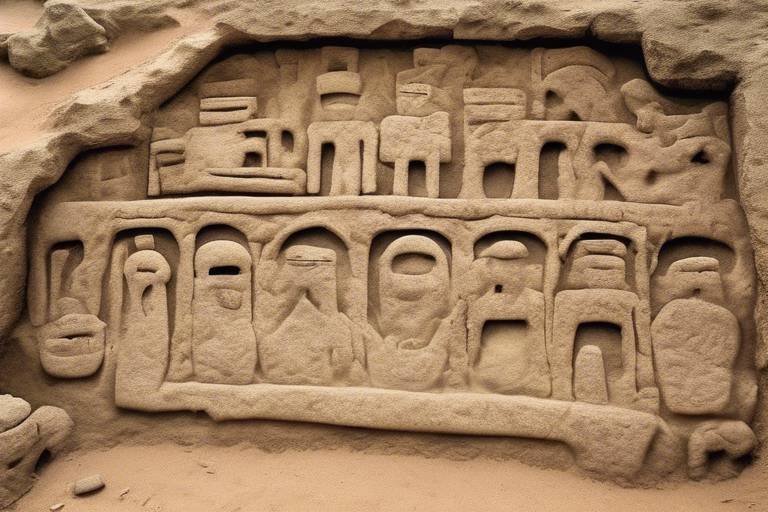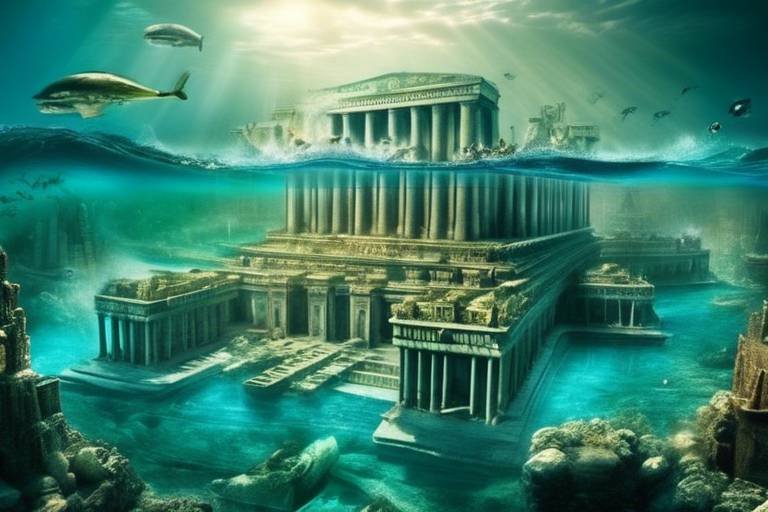Uncovering the Lost City of Atlantis - Myth or Reality?
Have you ever pondered the mystery of the lost city of Atlantis - a tale shrouded in myth and speculation, yet captivating the minds of many for centuries? The quest to uncover the truth behind this enigmatic civilization continues to spark curiosity and debate among historians, archaeologists, and enthusiasts alike. Was Atlantis merely a figment of imagination, a fictional creation woven into ancient lore, or could there be a kernel of truth buried beneath the layers of myth and legend?

History of Atlantis
The history of Atlantis is a captivating tale that has intrigued scholars, historians, and explorers for centuries. According to the ancient Greek philosopher Plato, Atlantis was a powerful and advanced civilization that existed around 9,000 years before his time. Described in his dialogues "Timaeus" and "Critias," Atlantis was said to be a utopian society located beyond the "Pillars of Hercules," believed to be the Strait of Gibraltar.
Plato's accounts of Atlantis portray it as a wealthy and technologically advanced civilization, boasting impressive architecture, engineering feats, and a prosperous society. The city was said to be ruled by a series of kings descended from the sea god Poseidon, who imparted his divine knowledge to the Atlanteans.
While some scholars argue that Plato's narrative of Atlantis was purely allegorical or fictional, others believe that there could be a historical basis for the story. The mention of specific details such as geography, governance, and societal structure has led to various interpretations and speculations about the possible existence of Atlantis.
Aside from Plato's writings, other ancient texts and mythologies also make references to a great civilization that met a tragic end. From the biblical story of the Great Flood to the legends of Mu and Lemuria, the concept of a lost civilization has permeated various cultures and traditions throughout history.
The mystery surrounding Atlantis continues to captivate the imagination of people worldwide, fueling expeditions, research, and debates in search of the truth behind this enigmatic civilization. As technology advances and new discoveries are made, the quest to uncover the lost city of Atlantis persists, blurring the lines between myth and reality.

Geographical Theories
Geographical theories surrounding the lost city of Atlantis have sparked numerous debates and speculations throughout history. According to ancient texts, Atlantis was said to have been a powerful and advanced civilization that ultimately met a tragic demise. Various hypotheses have emerged regarding the possible location of this legendary city, with some theories suggesting it could be submerged beneath the waters of the Mediterranean Sea, while others propose the vast expanse of the Atlantic Ocean as its resting place.
One prominent theory suggests that Atlantis could have been located in the vicinity of modern-day Santorini, a volcanic island in the Aegean Sea. The catastrophic eruption of the Santorini volcano around 1600 BC has led some researchers to believe that this event may have inspired the Atlantis myth. The idea of a once-thriving civilization being engulfed by the sea due to natural disasters has captured the imagination of many.
On the other hand, some scholars argue that Atlantis might have been situated in the Atlantic Ocean, beyond the pillars of Hercules (Straits of Gibraltar). This theory aligns with Plato's description of Atlantis being located "beyond the Pillars of Hercules" and its size being larger than Asia and Libya combined. The vastness of the Atlantic Ocean has made it a compelling candidate for the possible location of this enigmatic city.
Moreover, recent advancements in technology, such as sonar mapping and satellite imaging, have enabled researchers to explore underwater landscapes with greater precision. These technological tools have been instrumental in surveying the ocean floor and uncovering potential underwater structures that could be remnants of a lost civilization like Atlantis.
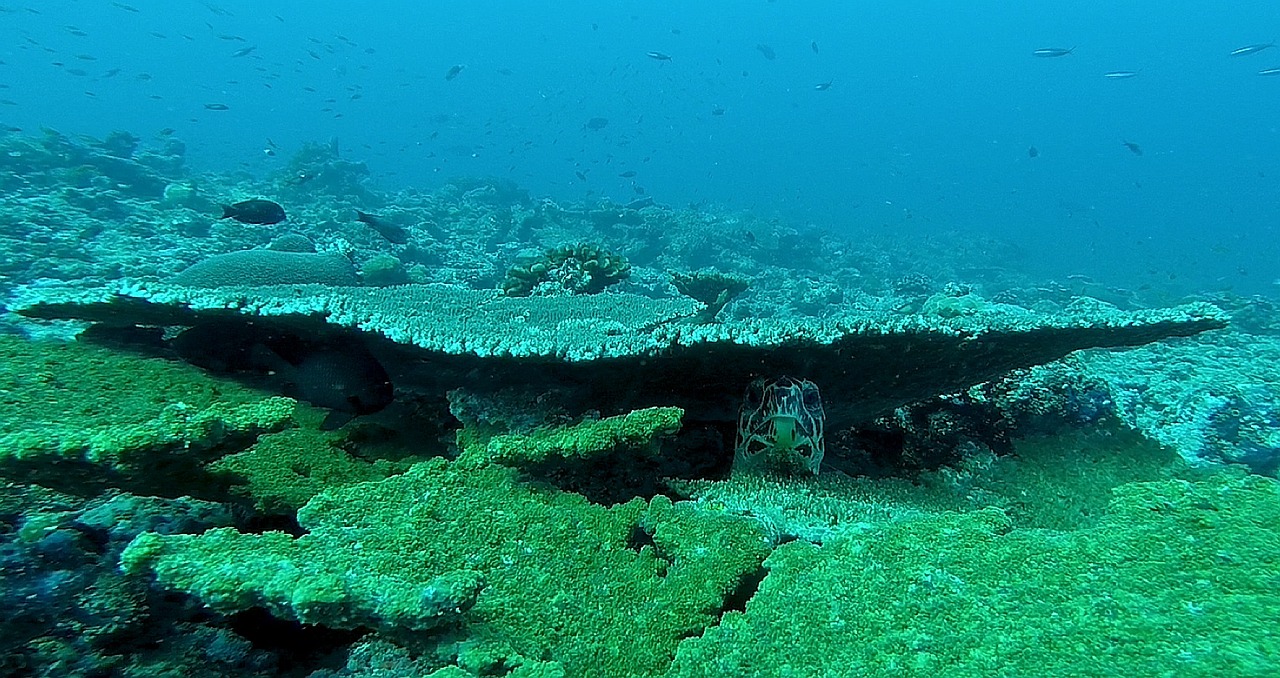
Technological Advancements
Many have been captivated by the mystery of Atlantis, a legendary city believed to have vanished beneath the waves. In this article, we delve into the various aspects surrounding the enigmatic tale of Atlantis, exploring its history, geographical theories, technological advancements, cultural impact, scientific evidence, legendary accounts, exploration expeditions, debates, skepticism, as well as modern theories and interpretations.
Advancements in technology have revolutionized the way we approach the search for Atlantis. Through the use of modern tools like sonar and satellite imaging, researchers are able to delve into the depths of the ocean with unprecedented precision. Sonar technology, for instance, allows us to create detailed maps of the ocean floor, potentially revealing hidden structures that could be remnants of the fabled city.
Furthermore, satellite imaging provides a bird's eye view of vast underwater regions, aiding in the identification of anomalies that may indicate the presence of man-made structures. These technological innovations have opened up new possibilities for underwater exploration, allowing us to peer into the depths of the ocean with a clarity never before possible.

Cultural Impact
The of the Atlantis myth has been profound and far-reaching, permeating various aspects of human creativity and imagination. From ancient times to the present day, the allure of a lost civilization has inspired countless works of literature, art, and entertainment, capturing the fascination of people worldwide.
Throughout history, the story of Atlantis has served as a rich source of inspiration for writers, poets, and artists, fueling the creation of epic tales and artistic masterpieces. The myth of a once-great city submerged beneath the waves has sparked the imagination of storytellers, leading to the production of numerous novels, plays, and films that seek to unravel the mystery of Atlantis.
Artistic representations of Atlantis have ranged from elaborate paintings depicting the city's majestic architecture to intricate sculptures embodying the grandeur of its civilization. The myth has also found its way into music, with composers drawing inspiration from the enigmatic tale to create symphonies and operas that evoke the mystique and tragedy of Atlantis's demise.
Moreover, the cultural impact of Atlantis extends beyond the realms of art and literature, influencing popular culture and societal beliefs. The enduring fascination with the lost city has permeated modern media, with television shows, video games, and documentaries exploring different interpretations of Atlantis and its significance in the collective consciousness.
Furthermore, the Atlantis myth has become a symbol of human ambition and hubris, serving as a cautionary tale against the perils of unchecked power and technological advancement. The story of a civilization brought to ruin by its own arrogance continues to resonate with contemporary audiences, prompting reflection on the fragility of human achievements and the consequences of environmental neglect.

Scientific Evidence
When it comes to the mysterious tale of Atlantis, the quest for scientific evidence has been both compelling and elusive. Geological and archaeological findings have been at the forefront of the search, aiming to either validate or debunk the existence of this enigmatic civilization. Scholars and researchers have scoured the depths of the ocean, analyzed ancient ruins, and studied geological formations in pursuit of the truth.
One of the key pieces of scientific evidence often cited in support of Atlantis is the discovery of ancient structures submerged underwater. These structures, sometimes resembling advanced architectural designs, have sparked debates among experts about their origin and potential connection to the lost city. Additionally, geological anomalies and underwater formations have been scrutinized for clues that could point to a once-thriving civilization.
Archaeological excavations have unearthed artifacts and remnants that some believe could be linked to Atlantis. Pottery shards, tools, and other objects found in various locations have fueled speculation about the existence of an advanced society that met a catastrophic end. However, interpreting these findings in the context of Atlantis remains a subject of intense debate and scrutiny.
Furthermore, scientific analyses of geological data have provided insights into the geological history of regions that align with descriptions of Atlantis in ancient texts. The examination of sediment layers, rock formations, and marine life patterns has offered valuable information that researchers use to piece together the puzzle of this legendary city. By combining geological evidence with historical accounts, scientists aim to unravel the mystery of Atlantis.
In the realm of scientific exploration, advancements in technology have played a pivotal role in the search for Atlantis. Sonar mapping, satellite imaging, and underwater drones have enabled researchers to explore remote and inaccessible areas with unprecedented precision. These technological marvels have revolutionized underwater archaeology and provided new avenues for investigating the existence of ancient civilizations like Atlantis.
Despite the strides made in scientific research, the quest to uncover concrete evidence of Atlantis continues to be shrouded in mystery and intrigue. The scientific community remains divided on the validity of the Atlantis narrative, with skeptics questioning the reliability of the evidence presented and proponents advocating for further exploration and analysis. As technology advances and new discoveries emerge, the enigma of Atlantis persists, captivating the imagination of scholars and enthusiasts alike.

Legendary Accounts
Legend has it that the story of Atlantis originated from the ancient Greek philosopher Plato, who described a powerful and advanced civilization that mysteriously disappeared beneath the waves. This tale of a prosperous island city with grand architecture, advanced technology, and a tragic downfall has captivated the imaginations of people for centuries. The legend of Atlantis has been intertwined with various ancient myths and accounts, adding layers of mystery and intrigue to its narrative.
One of the most famous accounts of Atlantis comes from Plato's dialogues "Timaeus" and "Critias," where he narrates the story of Atlantis as a naval power that sought to conquer lands until it was defeated by Athens and ultimately submerged into the sea in a single day and night. The detailed descriptions of Atlantis's layout, its concentric rings of water and land, and its advanced civilization have sparked numerous interpretations and speculations about its possible existence.
Other ancient texts and myths also make references to a lost city or civilization that met a catastrophic end. The ancient Egyptian priest and historian Manetho mentioned a great island called "Atalantis," while the epic poem "The Odyssey" by Homer speaks of a prosperous city beyond the Pillars of Hercules that suffered a similar fate. These legendary accounts, though varied in details, all contribute to the enigmatic allure of Atlantis.

Exploration Expeditions
Exploration expeditions aimed at unraveling the mysteries surrounding the lost city of Atlantis have captivated the imagination of adventurers and researchers alike for centuries. These daring quests into the depths of the ocean seek to uncover the truth behind the legendary city's existence and demise. From the sunken ruins of ancient civilizations to uncharted underwater territories, these expeditions are fueled by a relentless pursuit of uncovering one of history's greatest enigmas.

Debates and Skepticism
When it comes to the legendary city of Atlantis, debates and skepticism have always been prevalent among scholars and researchers. The very existence of Atlantis has been a subject of intense scrutiny and controversy, with opinions varying widely on whether it was a real civilization or simply a fictional creation.
Some experts argue that the story of Atlantis is purely a myth, a moral tale crafted by Plato to convey philosophical ideas rather than a historical account. They point to the lack of concrete evidence and the fantastical elements in Plato's dialogues as reasons to doubt the existence of Atlantis.
On the other hand, there are those who believe that Atlantis was a real place that met a catastrophic end, possibly due to natural disasters or war. Proponents of this view often cite geological and archaeological findings that they claim support the existence of an advanced ancient civilization in the distant past.
The debate surrounding Atlantis also extends to its proposed locations, with numerous theories ranging from the Mediterranean Sea to the Caribbean. Some researchers argue for a more metaphorical interpretation of Atlantis, suggesting that it could represent a lost utopia rather than a tangible city.
Despite ongoing research and exploration efforts, conclusive proof of Atlantis remains elusive, fueling further skepticism and debate within the academic community. The mystery of Atlantis continues to captivate the imagination of people around the world, prompting endless speculation and discussion.

Modern Theories and Interpretations
Modern theories and interpretations surrounding the elusive mystery of Atlantis have sparked a plethora of debates and discussions among scholars and enthusiasts alike. While some continue to view Atlantis as a mere mythological tale, others propose intriguing hypotheses that attempt to bridge the gap between legend and reality.
One prevailing modern theory suggests that Atlantis could have been a sophisticated ancient civilization, possibly located in the Mediterranean region, which was devastated by a natural catastrophe. Proponents of this theory point to geological evidence and ancient maps as potential clues supporting the existence of such a civilization.
Another fascinating interpretation revolves around the idea that Atlantis might not have been a physical place but rather a metaphorical representation of a utopian society or an allegory for the rise and fall of civilizations. This perspective delves into the symbolic significance of Atlantis in philosophical and historical contexts.
Moreover, advancements in fields such as archaeology and geology have led to innovative approaches in analyzing the Atlantis legend. By combining scientific research with historical data, researchers aim to unravel the enigmatic story of Atlantis and its possible connections to real-world events.
Furthermore, some modern interpretations explore the psychological and cultural implications of the Atlantis myth, highlighting how the allure of a lost civilization continues to captivate the human imagination. The enduring appeal of Atlantis in literature, art, and popular culture underscores its timeless fascination and relevance in contemporary society.
Frequently Asked Questions
- Is Atlantis a real place?
While the existence of Atlantis remains a topic of debate and speculation, there is no concrete evidence to prove its existence as a physical location. The story of Atlantis is primarily known through ancient texts and myths, with no definitive proof of its actual existence.
- Where is Atlantis believed to have been located?
Various theories suggest different locations for Atlantis, ranging from the Mediterranean Sea to the Atlantic Ocean. However, no consensus has been reached among scholars and researchers regarding the precise location of the fabled city.
- What technological methods are being used to search for Atlantis?
Modern technologies like sonar, satellite imaging, and underwater exploration vehicles are being utilized to survey the ocean floor in search of any potential remnants of a lost civilization. These advancements have provided new insights into underwater archaeology but have yet to definitively uncover Atlantis.
- How has the myth of Atlantis influenced popular culture?
The myth of Atlantis has inspired numerous works of literature, art, films, and even video games. Its enigmatic nature and the allure of a lost civilization have captivated the imagination of people for centuries, leading to its pervasive presence in various forms of media and entertainment.
- What do scientists say about the existence of Atlantis?
Scientists approach the Atlantis legend with skepticism, viewing it more as a metaphorical tale rather than a historical reality. While some geological and archaeological findings may align with aspects of the Atlantis story, conclusive evidence supporting its existence is lacking.

